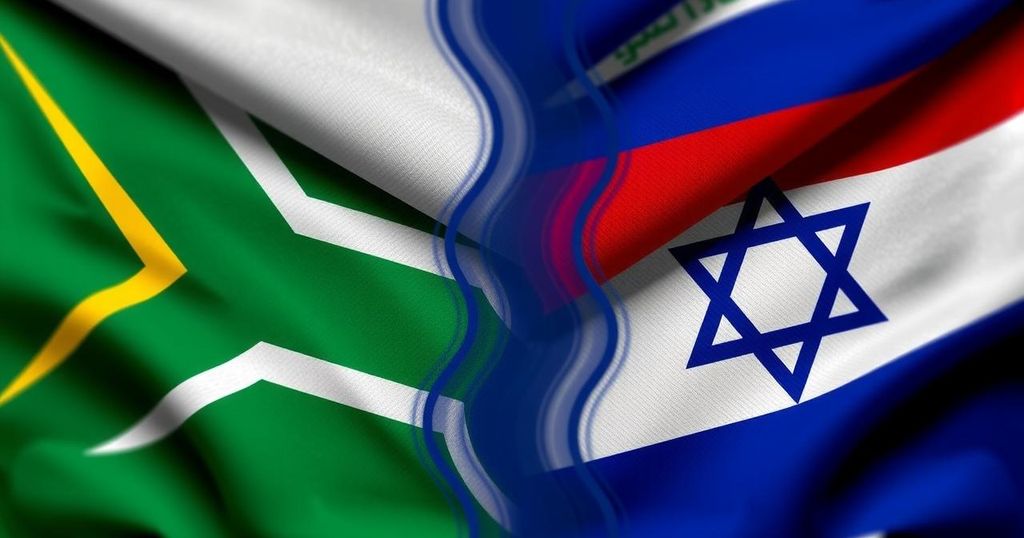South Africa and Somalia have condemned Israel’s military attacks on Iran, citing threats to regional security. South Africa’s Foreign Ministry identified the strikes as violations of Iran’s sovereignty, while emphasizing the humanitarian crisis in Gaza. Both countries call for an immediate cease-fire and international action to address the worsening situation, amidst rising tensions following recent hostilities.
South Africa and Somalia have issued strong condemnations against Israel’s recent military actions targeting Iran, stating that these actions pose a significant threat to regional stability. The South African Foreign Ministry characterized the attack as an unacceptable violation of Iranian sovereignty in a formal statement issued late Saturday. Moreover, the ministry highlighted the broader humanitarian crisis in the Middle East, referencing ongoing conflicts in Gaza, Lebanon, and the systematic annexation of the West Bank as contributors to the deteriorating situation. South African Foreign Minister Ronald Lamola urged for an immediate cease-fire in Gaza, emphasizing the necessity of humanitarian relief for affected civilians. He condemned the Israeli military’s ongoing operations in northern Gaza and highlighted the alarming detention of medical personnel as a violation of international humanitarian standards. In line with these declarations, South Africa called for the prompt enactment of UN Security Council Resolution 2735, which supports a comprehensive cease-fire plan initiated by U.S. President Joe Biden. Similarly, the Somalian government strongly condemned the airstrikes conducted by Israel on Iranian military installations. In its official statement, Somalia urged the international community to take decisive measures to safeguard the region’s security, warning of the potential for escalated conflict following these aggressive actions. The ongoing clashes, which have intensified since a cross-border attack by Hamas last October, have resulted in significant casualties, with reports indicating that nearly 43,000 individuals, primarily women and children, have perished, alongside over 100,000 injuries. These developments have led to the near-total displacement of Gaza’s populace, amidst dire shortages of essential resources such as food and medical supplies. Furthermore, Israel confronts a potential genocide case at the International Court of Justice for its operations in Gaza. In response to the recent violence, the Israeli military claims that its airstrikes targeted Iranian facilities in response to previous missile attacks from Iran. The U.S. government has warned that continued hostilities between Israel and Iran must cease and has cautioned Iran about possible repercussions for its retaliatory actions. The situation remains precarious, with the potential for broader conflict loom due to the increasing tensions following Israel’s actions.
The recent conflict involving Israel, Iran, Gaza, and surrounding nations has escalated dramatically following a series of military engagements. Israel’s actions are often framed within the context of its long-standing issues with Palestinian groups, particularly Hamas. The consequences of ongoing military engagements have sparked humanitarian crises, particularly in Gaza, leading to calls for international intervention and adherence to humanitarian laws. The destabilization of the Middle East and ongoing national sovereignty violations have prompted responses from various countries, calling for de-escalation and adherence to international resolutions.
In summary, both South Africa and Somalia have explicitly condemned Israel’s recent military actions against Iran, reflecting broader concerns regarding regional security and humanitarian crises stemming from ongoing conflicts. South Africa has advocated for an immediate cease-fire in Gaza while condemning violations of humanitarian law, and Somalia has urged international accountability. The actions of Israel raise significant alarm due to their potential to escalate into a wider conflict in the already volatile Middle East, highlighting the urgent need for diplomatic resolutions and safeguarding human rights.
Original Source: www.aa.com.tr







